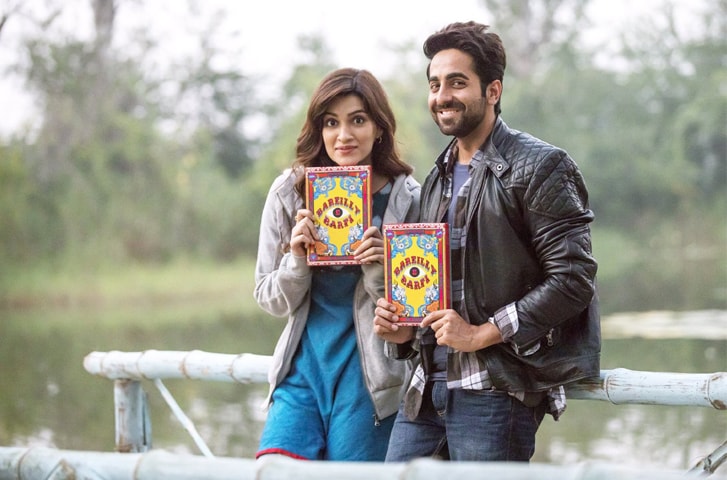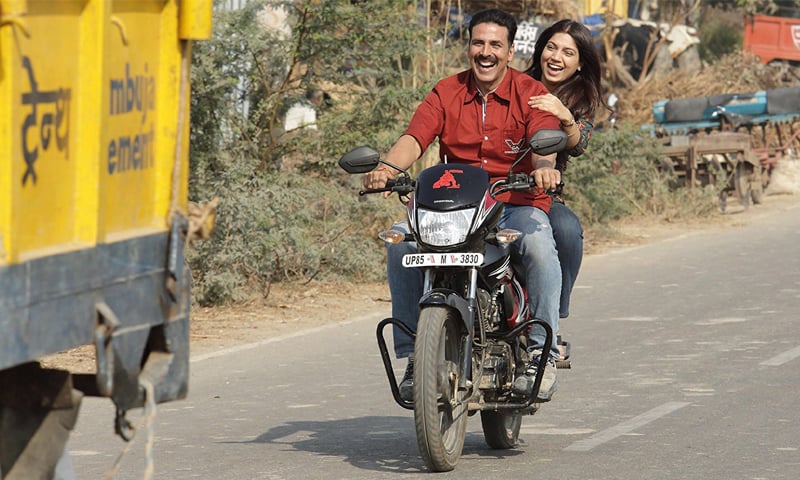Toilet: Ek Prem Katha, an unusual title for a love story, is a cautionary tale of fighting for life’s basic necessities. In the film, love hinges on finding an easily accessible place to defecate — preferably within a mile from one’s home.
Don’t laugh. This is still a big problem in India where some religious sub-classes — and a lot of primitive thinking — forbid people from relieving themselves within town limits. To poop, one has to walk to the outskirts, preferably out of sight of peeping toms. After a few years of doing this, peeping toms aren’t as big an issue as the long trek, especially when one is desperate.
This notion makes us sympathise with Jaya (an excellent Bhumi Pednekar), a recently married woman who is woken up at the crack of dawn after her wedding night by female neighbours. This group is a “Lota Party” and every town or village has them — women banding together before sunlight so they can walk out of the village to relieve themselves before the world wakes up!
Jaya, an educated and forward-thinking woman, is left aghast and embarrassed. How is she able to huddle with strangers in some remote field? And what if she wants to go in the middle of the day? (She is told to “hold it in”).
Toilet Ek Prem Katha and Bareilly Ki Barfi are well-conceived must-see films
Jaya’s husband Keshav (Akshay Kumar) has a bunch of solutions from stealing portable toilets to syncing with a train’s stop-over time at their station so that she can use the compartment’s lavatory.
Each juggad (make-do arrangement) is just that — temporary and ineffective. At one point, Jaya finds herself locked in a train’s toilet. To her, this is the last straw. One can’t help but cheer for the girl at this point. At least back in her parent’s home she can go in peace and at will.
This is when Keshav decides to undertake a task more difficult than moving heaven and earth: getting the government to take action. Media outlets spring into action at the sansani (sensational news) — a woman leaves her home because the locals (including Keshav’s father played by actor Sudhir Pandey) with their archaic thinking won’t let Jaya’s husband make a toilet within village limits.
Toilet: Ek Prem Katha is a smartly-written public service message from writers Siddharth Singh and Garima Wahal (screenwriters of Goliyon Ki Rasleela Ram-Leela). Keshav and Jaya’s plight is inspired by a real-life incident which coincides with the Indian government’s ‘Swachh Bharat Abhiyan’ (Clean India Mission) — a project to end open defecation — and a resulting three billion rupees scam. For once though, the film openly blames public mindset for their predicament.
The love story is fleshed out with several other real-world problems in India. For example, Keshav has to marry a cow because he was not born with the right kismet; Jaya has to have two thumbs so that her kundli becomes compatible with Keshav. Director Shree Narayan Singh (editor of Special 26, Rustom and Baby) keeps the lead pair’s romantic connection resilient and persuasive within far grander circumstances, especially when these messages overpower the actors.
Toilet’s first half is typically Bollywood, establishing Keshav’s persona with kinks one expects from an A-list star such as Akshay. It’s a good decision because Toilet wouldn’t have worked if the screenplay didn’t resort to conventional, mainstream aspects spearheading the plot.
Toilet’s post-intermission run is mostly a long, engaging campaign about getting public toilets made in India. Even the superb soundtrack (lyrics by Siddharth-Garima, music by Vickey Prasad) plays up the film’s theme. The novelty of this very real problem makes Toilet: Ek Prem Katha a captivating romantic-drama, especially when one sees Jaya and Kashav search frantically for a lavatory. I’m sure everyone can relate to the dilemma. We’ve all felt that desperation.
Bareilly Ki Barfi

Trailers spoil the movie — in most cases they give away everything. The solution is simple: forego watching the trailer and make exceptions only when short-listing a list of must-see films. It is with this mindset that I saw Bareilly Ki Barfi (BKB) — a romantic comedy directed by Ashwiny Iyer Tiwari about wooing the girl with the worst possible plan: using a stand-in.
BKB starts with a narrator describing Bitti (Kriti Sanon). She is a non-conformist wild child whose shenanigans don’t really raise hell or push her parents on the verge of shame or a nervous breakdown.
Bitti watches English movies but only understands 60 percent of them — which is enough for her to make the right deductions. Belonging to a vegetarian family, she once mistakenly ate chicken and has been eating it ever since. She secretly smokes, drinks alcohol when no one is watching, dances like she’s the life of the party and doesn’t like it when would-be groom candidates ask her if she’s still a virgin. Pissed off, she asks the same question in retaliation, and her assertiveness is deliberately misinterpreted as bad manners.
Agitated with life, she runs away from home and luckily buys a copy of Bareilly Ki Barfi, a novel by an unknown writer called Pritam Vidrohi that chronicles Bitti’s life and persona with immaculate detail. Intrigued, she returns home and begins her search for Pritam — a man whose picture (where he looks as if he’s crying) is printed on the back of the novel. Here is a man who could finally understand her, she thinks.
This leads us to Pritam (Ayushman Khurana) — but he is not the man in the picture. Pritam is a depressed romantic with a penchant for crafting stories and whose former love had been an exact duplicate of Bitti. In a state of perpetual gloom he had penned Bareilly Ki Barfi and pressured a lackey-cum-friend to pose for the photo as his stand-in.
This complicates matters because Bitti is adamant about finding the man in the picture — a dilemma Pritam further complicates by his own “creative solutions” (fact: no matter how skilled, writers often muck up their own stories).
Pritam’s lackey-friend is Chiragh Doobey (Rajkumar Rao), a meek, fainthearted man with a shaky, squeaky voice who had fled town because of his so-called friend’s pressures.
To woo Bitti, Pritam finds Chiragh and forces him to become a literal manifestation of a bad boy. A rugged, bad-mannered man (especially towards women) mimicking Amitabh Bachchan’s voice, sporting cheap reflective spectacles, a leather jacket and a bike.
Pritam wants Chiragh to put off Bitti so that he can make his move. His plan backfires spectacularly because he creates a monster. As spellbinding as Rajkumar and his transition of character is, one cannot help but feel that he is a delicate part of a closely-woven narrative with Khurana (to a large extent) and Sanon.
While the acting by Sanon (quite good), Khurana (remarkable) and Rajkumar Rao (spectacular) glues viewers to their seats, the lynchpin of the film is its female director. A woman’s touch at the helm saves BKB from turning rowdy or vulgar. At times, one feels a familiar mix of detail and sensitivity that males often lack.
However, to give Ashwiny her due, she is fantastic in both the creative and technical end of the film’s direction. Her camera is steady or shaky at the right moments; her frames impeccably accurate for the shot. The edit (one of the first things I noticed) is tight, snipping away any scenes or shots that may interrupt one’s level of interest.
BKB’s appeal is like Rajkumar’s character, both as Pritam and Chiragh. Sometimes one finds more depth than one presumes. I think no trailer can brace you for that.
Published in Dawn, ICON, August 27th, 2017















































Dear visitor, the comments section is undergoing an overhaul and will return soon.